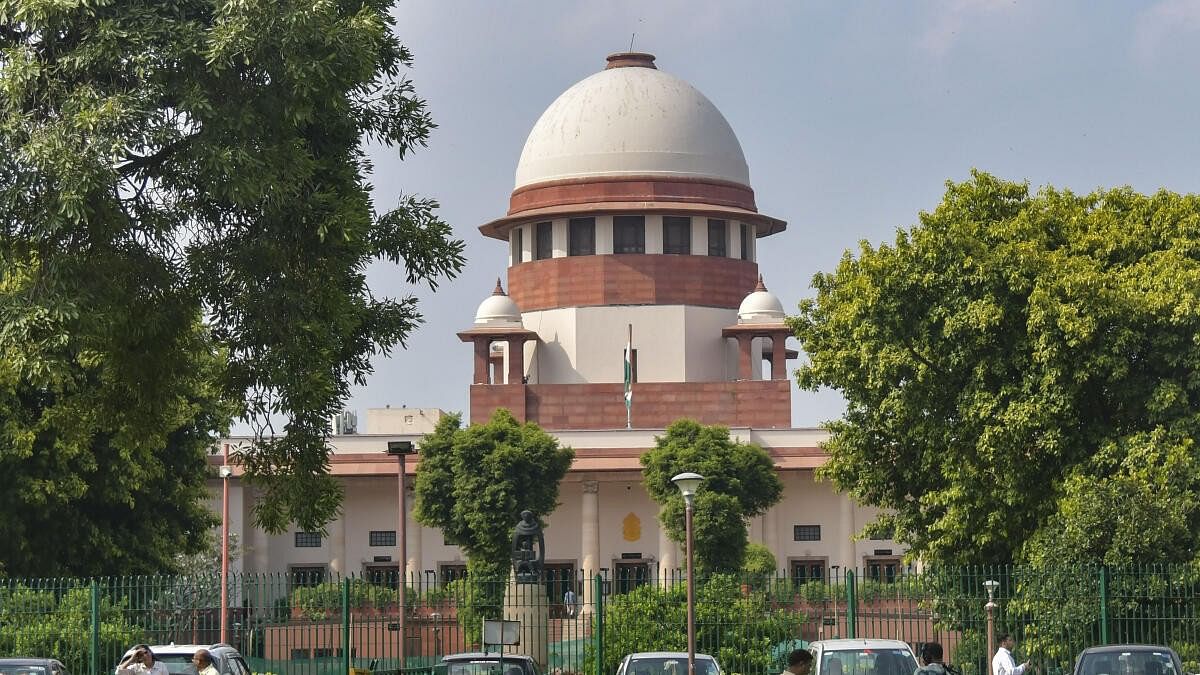
The Supreme Court of India.
Credit: PTI Photo
New Delhi: In a major landmark decision, the Supreme Court on Thursday struck down the Electoral Bonds Scheme introduced on January 2, 2018 as an anonymous mode to contribute to political parties by declaring it as "unconstitutional" for violating the right to information of citizens and possible quid pro quo by the large corporations.
A five-judge Constitution bench led by Chief Justice of India D Y Chandrachud also held amendment to the Companies Act allowing unlimited corporate donations to political parties was arbitrary and violative of the right to equality under Article 14 of the Constitution.
In its unanimous decision, the court directed the disclosure of information on contributions received by political parties under the scheme to give logical and complete effect to the ruling.
The CJI authored the lead judgment on behalf of himself and Justices B R Gavai, J B Pardiwala and Manoj Misra on a batch of petitions filed by NGO Association for Democratic Reforms, CPI (M), Congress leader Jaya Thakur and others.
Justice Sanjiv Khanna wrote his separate and concurring judgment.
"We are of the opinion that the information about funding to a political party is essential for a voter to exercise their freedom to vote in an effective manner. The Electoral Bond Scheme and the impugned provisions to the extent that they infringe upon the right to information of the voter by anonymising contributions through electoral bonds are violative of Article 19(1)(a) of the Constitution," the bench said.
The court, however, held that informational privacy to political affiliation is necessary to protect the freedom of political affiliation and exercise of electoral franchise. But the large corporations cannot be equated with individual donors like, students, teachers, daily wagers etc.
The court pointed out the reason for political contributions by companies is as open as day light. "Even Solicitor General Tushar Mehta did not deny during the course of the hearings that corporate donations are made to receive favors through quid pro quo arrangements," the bench pointed out
The court said information about political funding would enable a voter to assess if there is a correlation between policy making and financial contributions.
It rejected the argument of the Union government that the scheme protects the confidentiality of the contributor akin to the system of secret ballot as erroneous.
"The scheme only grants de jure and not de facto confidentiality vis-à-vis the political party. Under the current scheme, it is still open to the political party to coerce persons to contribute," it said.
"We are unable to see how the disclosure of information about contributors to the political party to which the contribution is made would infringe political expression. The disclosure of the particulars of the contributions may affect the freedom of individuals to the limited extent that the political party with the information could coerce those who have not contributed to them," the bench added.
The court also said the Union government has been unable to establish that the measure employed in Clause 7(4) of the Electoral Bond Scheme on confidentiality is the least restrictive means to balance the rights of informational privacy to political contributions and the right to information of political contributions.
"The purpose of securing information about political funding can never be fulfilled by absolute non-disclosure. The measure adopted does not satisfy the suitability prong vis-à-vis the purpose of information of political funding," the bench said.
The court said the companies and individuals cannot be equated for the purpose of political contributions.
"The amendment to Section 182 by permitting unlimited corporate contributions (including by shell companies) authorises unrestrained influence of companies on the electoral process. This is violative of the principle of free and fair elections and political equality captured in the value of “one person one vote”," the bench said.
It said the provision, as amended by the Finance Act 2017, does not recognise that the harm of contributions by loss making companies in the form of quid pro quo is much higher.
"Thus, the amendment to Section 182 (of the Companies Act) is also manifestly arbitrary for not making a distinction between profit-making and loss-making companies for the purposes of political contributions," the bench said.
The bench also pointed out the Electoral Bond is not distinguishable from other modes of contributions through the banking channels such as cheque transfer, transfer through the Electronic Clearing System or direct debit if the anonymity component is struck down. Thus, the Electoral Bond Scheme 2018 will also consequentially have to be struck down as unconstitutional, it said.
The scheme brought in through the Finance Act, 2017 by then Finance Minister Arun Jaitley also stipulated that the information furnished by the buyer shall be treated as confidential which shall not be disclosed by any authority except when demanded by a competent court or by a law enforcement agency upon the registration of criminal case.
According to the data on contributions made through electoral bonds, 94 % of the contributions through electoral bonds have been made in the denomination of one crore, the court noted.
Track reactions to the verdict here.
